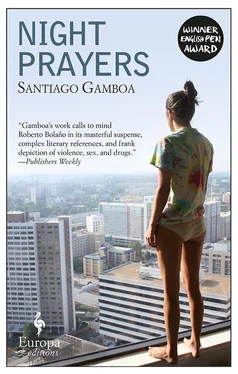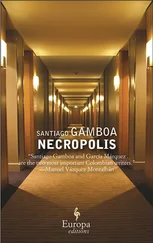Santiago Gamboa
Night Prayers
To Analía and Alejandro, walking to Farfa
Do not utter my name when you learn that I have died,
from the dark earth it would come through your voice.
— ROQUE DALTON
What remained in the end, however the world or life changed,
was the immutable fact of a universe abandoned by God.
— LOU ANDREAS SALOMÉ
All cities have a fairly definite smell, but for most of the day the smell of Bangkok is covered by a dense blanket of smog that conceals it, making it hard to perceive. When it finally appears, well after darkness has fallen — when the city is quiet, when it has at last calmed down — it’s a tangible substance that floats in the air, moves along the winding streets, and penetrates the remotest alleyways. It may come from the canals of stagnant water, where it’s quite common to see people cooking or washing clothes; from the dried fish stands in Chinatown, the satay and fried food in Patpong and Silom Road, or even the live animals that wait in wicker cages in Chatuchak Market; or it may simply come from the vapors of the Chao Phraya, the brown river that crosses the city, invading it like an insidious illness.
Today it’s pouring rain. The waters of the river heave and ripple, as if about to engulf the sampans and canoes that dare to navigate it. That’s what I see through the window of my room on the fourteenth floor of the Shangri-La Tower at the Hotel Oriental. Shangri-La: the name means “paradise” but to me it suggests something else, “solitude,” maybe, or just “waiting.” Night has already fallen, and I’m drinking gin, my face glued to the window, looking out at a landscape distorted by rain: the Chao Phraya, the lights of Bangkok, the blue skyscrapers, the storm clouds streaked with lightning, the incredible metropolis.
When I switch on the air-conditioning, the grille gives off a strong smell, a mixture of damp and rust. What time is it? Almost eight. I’ll go down soon, have dinner, then get through a few more gins. In spite of my age (I’ve just turned forty-five) I still believe in chance, the throw of the dice involved in going out into the night to look for a drink in a foreign city, an adventure we are less and less suited to with time, which is why, as the years go by, some prefer a bottle by the couch in front of the TV. But not me. I prefer to wander the city, refusing to sleep without having tried that first.
But what am I doing here, apart from launching these thoughts into the rotten air? Waiting, waiting, waiting. Or rather: remembering. I’ve made an appointment with memory.
I came to Bangkok intending to remember. To look again at what I lived through in this city a few years ago, but in another light. Sometimes, time is a question of light. With the passing of the years, while some forms become strangely opaque, others acquire brilliance. They are the same, yet they appear more vivid, and sometimes, just sometimes, we are able to grasp them. I’m not sure why. It may be no more than a wish, it may merely be words, but that’s precisely what I’m looking for: words. I want to reconstruct a story in order to tell it.
Something — I don’t know what, of course: perhaps an impulse, a creative élan, or simply an old sadness, I can’t be more specific — made me feel that I had to go over all this in writing: the events that brought me to Bangkok that first time, and their consequences. An old story trapped inside a city, which opens up onto others. At that time (the period I’m trying to remember) everything was different and I was another person. Not better or worse, only different and a little younger.
Let’s see now. Where to begin?
I’ll begin with the worst of it, Consul. The worst thing of all: my childhood. Although at this stage, to be honest, I don’t even know what the worst is.
I was born in Bogotá, in a lower-middle-class family, a family that was, as they say in the financial section of the newspapers, economically unsound and showing a marked downward trend. A family much affected by the crisis, down there at the bottom of all the indices and statistics, at the mercy of neoliberalism and the market economy. We also fitted the statistics in being a family of four. I was the second of two children, after an elder sister named Juana. We lived in the Santa Ana district, not up in the hills, where the rich live, but between Seventh and Ninth, which at that time was a mixture of middle-class people on the way down and what’s called the “upper working class,” in other words, the quintessence of pretention, frustration, and resentment. I don’t know, maybe I’m being unfair, but that’s how I remember it.
Mine wasn’t a happy family, and, as in Tolstoy’s novel, it was unhappy in its own way, although now that I think about it the only original thing was how all that frustration and resentment manifested itself. Anyway, that was where I was born. In an ugly old two-story house, similar to all the others in the neighborhood. Not far from an open sewer.
Mother made bouquets in a florist’s on Fifteenth that specialized in senior citizens’ parties, local festivals, and masses. Father worked in the national current accounts section of the Usaquén Park branch of the Colombian Industrial Bank, and in spite of breaking his back for ten hours a day earned just enough to pay his monthly bills. He was a model employee, but with so much pent-up resentment that I think if he’d had the opportunity to torture — anonymously — any of his colleagues or customers, and of course his boss, without there being any consequences (like in one of those virtual experiments that universities do into the cruelty or cold-bloodedness of the average person), he’d have gone about it with genuine brutality, releasing great spurts of blood, sending megawatts of electricity into nervous systems, pulling out nails with a penknife, burning testicles with a cattle prod, crushing bones. He’d have been responsible for a real massacre if the city had suddenly gone crazy and descended into chaos, sending us back to the Stone Age for a time. I can imagine him shattering the skulls of colleagues with a stone hammer, decapitating his customers with obsidian knives, jumping from one desk to another, his body covered in skins, his hair long and dirty, emitting grunts. But he had to swallow this impulse and keep his head down. He had to smile and be docile, in his cheap striped tie and his shiny suit.
The managers took advantage of him, humiliated him gratuitously. “Always look on the bright side,” he must have thought, gritting his teeth. Father had a real awareness of his class and believed it was his duty to wait patiently. Better times were around the corner. Times of revenge and justice. A happier era. In the meantime, they moved his desk to the most uncomfortable spot, gave him a chair that wobbled, placed him at the one counter window where the terminal didn’t work so that he’d have to do everything by hand. But the managers never invited him to the office on the second floor where they had cable TV. He pretended not to notice, or not to care. How inconsiderate of them, he said to Mother once, sending me to Carrefour to buy a bottle of Tres Esquinas for the Barcelona game, and then not even inviting me to sit down with them! “How inconsiderate,” that was all. He didn’t think he could express any other kind of anger. He had to keep supporting his family and it was best not to take risks.
Life wasn’t easy for him, and the worst of it was that Mother despised him for that very reason, although at home he was quite the opposite, bossy and tyrannical, as if to say, I’m the king of this little world! here everyone does what I say! and Mother, who was a traditional wife even though she never lost the opportunity to humiliate him in front of his friends, would say to him, yes, of course, go sit down and watch the game and I’ll bring you your food.
Читать дальше












